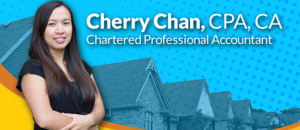The following is a guest post by Cherry Chan, Chartered Professional Accountant. Cherry specializes in real estate taxation and has many great posts on the subject on her blog. For more info visit Cherry’s website at: http://cccpa.ca/
Many investors ask me how they can invest their money within their Registered Retirement Saving Plans (RRSPs) in real estate without collapsing the plans and incur a large amount of tax liability. (This article applies to Registered Education Saving Plans and Registered Retirement Income Funds as well.)
So, other than buying public company stocks that are in real estate, are there any other ways to invest your RRSPs in real properties?
Unfortunately you cannot hold real properties in RRSPs.
It’s just not one of the qualified investments allowed by the government.
Mortgage, however, is one of the qualified investments in RRSPs. Instead of investing directly in real estate, you can lend money out and use real estate as the underlying collateral to guarantee your investment. In return, you get a fixed interest payment on a periodic basis.
An investor is allowed to lend money to himself, anyone related to him (children, siblings, parents) or a third party. There are different rules based on who you lend the money too.
Let’s use an example to explain. An investor has $300K cash in his RRSP account and would like to use it to invest in real estate.
Say he is buying a property for $300K and has $60K as downpayment (money is outside of the RRSP plan). He can either borrow the remaining $240K from his RRSP or he can borrow directly from a financial institution.
If he does decide to borrow the money from his RRSP, this mortgage must be administered by an approved lender under the National Housing Act, and insured. The amount of interest rate and terms must reflect regular commercial practice.
In other words, the investor has to put the RRSP in a self-directed RRSP account at an approved lender, such as Olympia Trust, pays for the CMHC (or any private insurer) insurance and the mortgage must carry similar terms and interest rate as what he would otherwise get from a regular bank.
Say the investor sets up everything properly at 3% interest rate. He is then paying interest to his RRSP on the $240K. Interest earned within his RRSP is not taxable until money is being withdrawn from the plan. Interest incurred on his property is deductible if it is a rental property.
But, is it really a wise idea to borrow against your own RRSP and invest in your own real estate portfolio?
The investor can lend the money to his friend, who’s considered as an arm’s length party, or any other third party. CMHC insurance is not required and the terms and interest rate do not need to be compatible with a regular bank. And it does not have to be administered by an approved lender under the National Housing Act.
The same investor can charge an interest rate at whatever he and his friend (or the third party) agree to. Usually it is higher than a traditional first mortgage offered by the bank. In some cases, if the investor lends the money as a second mortgage, he can get interest rate from 8% to 15% return. Similarly, the interest income earned within the RRSP is tax sheltered and will only be taxed at the investor’s hand when he withdraws the money from the plan.
If the investor borrows money against his RRSP to invest in his real estate property, because of the restrictions (interest rate has to be compatible to regular commercial mortgage) imposed by the government, returns within the RRSP is restricted.
Also, the investor is essentially investing 100% into this property. The risk is higher. (If the property has any issues, he is 100% invested in it.) Not only does he jeopardize his 20% downpayment, but also his RRSP money.
Ultimately, the decision should be driven by the return and the risk involved.
Until next time, happy real estate investing.
Cherry Chan, Your Real Estate Accountant
The above is a guest post by Cherry Chan, Chartered Professional Accountant. Cherry specializes in real estate taxation and has many great posts on the subject on her blog. For more info or to contact Cherry, visit her website at: http://cccpa.ca/
